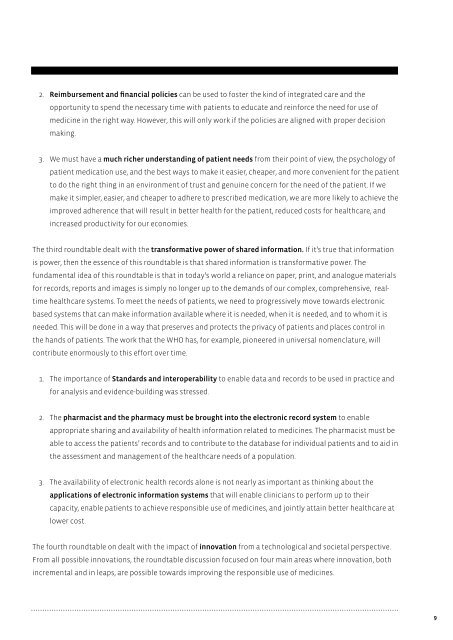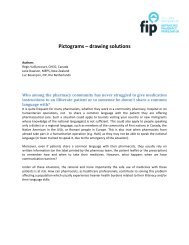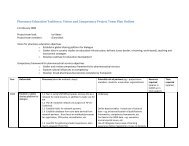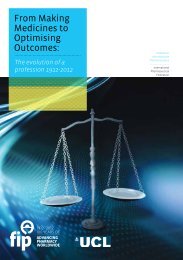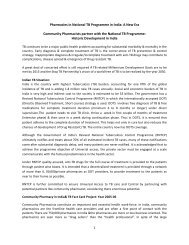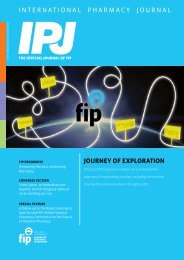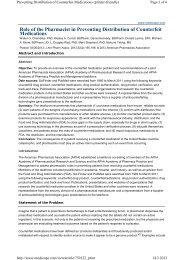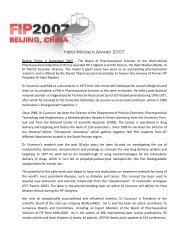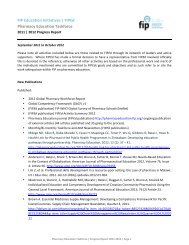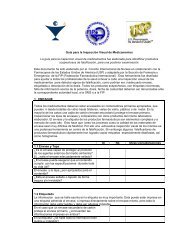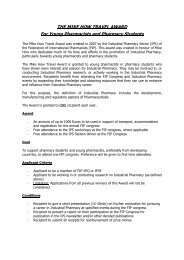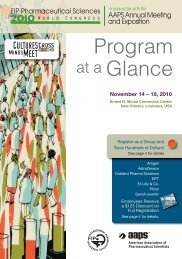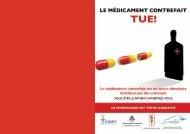here - FIP
here - FIP
here - FIP
You also want an ePaper? Increase the reach of your titles
YUMPU automatically turns print PDFs into web optimized ePapers that Google loves.
2. Reimbursement and financial policies can be used to foster the kind of integrated care and the<br />
opportunity to spend the necessary time with patients to educate and reinforce the need for use of<br />
medicine in the right way. However, this will only work if the policies are aligned with proper decision<br />
making.<br />
3. We must have a much richer understanding of patient needs from their point of view, the psychology of<br />
patient medication use, and the best ways to make it easier, cheaper, and more convenient for the patient<br />
to do the right thing in an environment of trust and genuine concern for the need of the patient. If we<br />
make it simpler, easier, and cheaper to ad<strong>here</strong> to prescribed medication, we are more likely to achieve the<br />
improved ad<strong>here</strong>nce that will result in better health for the patient, reduced costs for healthcare, and<br />
increased productivity for our economies.<br />
The third roundtable dealt with the transformative power of shared information. If it’s true that information<br />
is power, then the essence of this roundtable is that shared information is transformative power. The<br />
fundamental idea of this roundtable is that in today’s world a reliance on paper, print, and analogue materials<br />
for records, reports and images is simply no longer up to the demands of our complex, comprehensive, realtime<br />
healthcare systems. To meet the needs of patients, we need to progressively move towards electronic<br />
based systems that can make information available w<strong>here</strong> it is needed, when it is needed, and to whom it is<br />
needed. This will be done in a way that preserves and protects the privacy of patients and places control in<br />
the hands of patients. The work that the WHO has, for example, pioneered in universal nomenclature, will<br />
contribute enormously to this effort over time.<br />
1. The importance of Standards and interoperability to enable data and records to be used in practice and<br />
for analysis and evidence-building was stressed.<br />
2. The pharmacist and the pharmacy must be brought into the electronic record system to enable<br />
appropriate sharing and availability of health information related to medicines. The pharmacist must be<br />
able to access the patients’ records and to contribute to the database for individual patients and to aid in<br />
the assessment and management of the healthcare needs of a population.<br />
3. The availability of electronic health records alone is not nearly as important as thinking about the<br />
applications of electronic information systems that will enable clinicians to perform up to their<br />
capacity, enable patients to achieve responsible use of medicines, and jointly attain better healthcare at<br />
lower cost.<br />
The fourth roundtable on dealt with the impact of innovation from a technological and societal perspective.<br />
From all possible innovations, the roundtable discussion focused on four main areas w<strong>here</strong> innovation, both<br />
incremental and in leaps, are possible towards improving the responsible use of medicines.<br />
9


